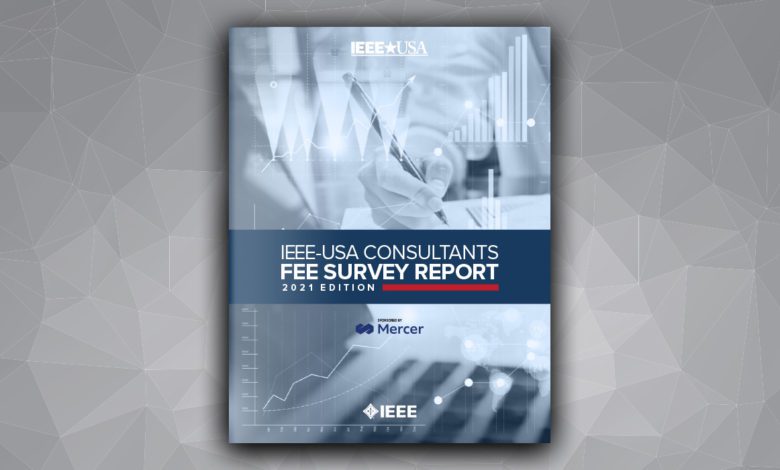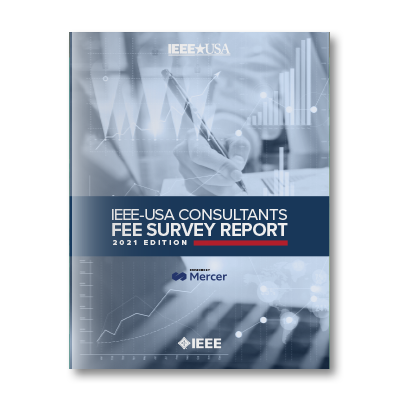

IEEE-USA has released its 2021 Consultants Fee Survey, focusing on the compensation of consultants, as well as on the impact of COVID-19 on members who earn at least half of their income from engineering consulting. Starting in 1998, this survey has been conducted every other year — through 2008; and annually, starting in 2009.
Despite COVID-19, there was a rise in the amount that respondents to the survey were billing as consultants. The average consultant billing was $170 per hour, up $20 over the previous survey. This rate was consistent, regardless of years of experience — except for those with less than 15 years of experience, whose median hourly rate was $158 an hour. The share of respondents with hourly rates at, or above, $200 per hour increased to 36.4%, up from 32.1% in 2020.
Educational differences in billing rates were consistent with the 2020 survey. Having a Ph.D. translated into a $45 higher median billing rate ($215 an hour), with 17.5% of respondents holding a Ph.D., or its equivalent. There is virtually no difference in hourly rate between those with a Bachelor’s degree and those with a Master’s degree.
Those with a Professional Engineer’s License (P.E.) experienced a $15 hourly advantage over those without a license (up $5 over the past two years, but down from the $22 hourly advantage in 2018).
Respondents working with clients in Utilities again reported the highest median hourly rates at $190 an hour. Those working with educational institutions and private defense industry reported a median hourly rate $20 below the overall median ($150 an hour).
Conducted in the spring of 2021, the survey of 13,223 IEEE members self-identified as consultants resulted in 1,329 responses, a response rate of 10%.
This year, the survey included a number of questions on COVID 19, specifically how it affected consulting activities in the past year. The report summarizes key positive and negative impacts listed by respondents.
The positive aspects of the pandemic included:
- Ability to work from home more often (overwhelmingly cited)
- New business acquired
- Increase in business from existing clients
Negative aspects of the pandemic included:
- Travel restrictions which limited productivity
- Difficulty in connecting or communicating with clients
- Delay of phases of projects or whole projects
- Balancing work with one’s own illness, or caring for others
- Diminished networking opportunities
- Reduced use of expert witnesses (courts closed)
- Expectations to work in unsafe conditions
Survey respondents were also asked to predict how COVID-19 might affect their consultant work going forward. Among the most common responses were:
- Consultants are more in demand for temporary work
- Firms will outsource more, due to staff and engineering shortages
- Consulting will increasingly be done remotely to save time and cost
- Companies are migrating to cloud-based systems, as project teams spread out across the United States
The survey also revealed interesting respondent demographics.
The median for years in consulting was 16, with nearly a quarter having 25 or more years. Male respondents had more years of experience than women, but this gender gap is closing with the report noting, “The shrinking professional experience gap is due to a growth in both women’s average years of professional experience, and a decline in men’s.”
The number of respondents who worked solely as independent consultants in the calendar year 2020 continues to decline. After peaking at 48.6% in 2018, it has declined steadily to 36% this year. The top three client areas were private sector (non-defense or utility) at 58.8%, defense (private and government) at 11.9%, and utilities at 11%.
Over half of respondents (51.7%, up from 42.7% in 2020) carry professional liability (errors & omissions) insurance.
The survey also asked to give the characteristics respondents would associate with an ideal client. Some themes that were consistent across respondents indicated an ideal client:
- Defines needs, possesses the ability to communicate, and is open to advice
- Has well thought-out needs and expectations
- Is forthright, honest and helpful
- Agrees to a fair contract to both parties, and pays on time
- Is interested in a long-term relationship
The complete 2021 IEEE-USA Consultant Fee Survey Report is available for purchase from the IEEE-USA Shop. The Report is $29.95 for members. Non-members pay $49.95.
Paul Lief Rosengren received a Master of Public Policy from the Kennedy School of Government, Harvard. He has spent the last three decades conducting strategic communications for NBC, the State of New Jersey, PSE&G and BD.


